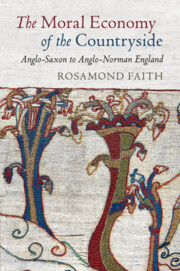Book contents
- Reviews
- The Moral Economy of the Countryside
- The Moral Economy of the Countryside
- Copyright page
- Contents
- Preface
- Abbreviations
- 1 Introduction: The Moral Economy
- Part I Rank
- Part II Reciprocity
- Part III Reputation and Witness
- Part IV The Wolf Sniffs the Wind
- Part V The Aftermath of Conquest
- 11 New Words in the Countryside
- 12 Narrating the New Social Order
- Part VI In the World of the Manor
- Appendix The Family Farm in Peasant Studies
- Bibliography
- Index
11 - New Words in the Countryside
from Part V - The Aftermath of Conquest
Published online by Cambridge University Press: 25 October 2019
- Reviews
- The Moral Economy of the Countryside
- The Moral Economy of the Countryside
- Copyright page
- Contents
- Preface
- Abbreviations
- 1 Introduction: The Moral Economy
- Part I Rank
- Part II Reciprocity
- Part III Reputation and Witness
- Part IV The Wolf Sniffs the Wind
- Part V The Aftermath of Conquest
- 11 New Words in the Countryside
- 12 Narrating the New Social Order
- Part VI In the World of the Manor
- Appendix The Family Farm in Peasant Studies
- Bibliography
- Index
Summary
Domesday Book was linguistically speaking an Anglo-Norman record using Latinized versions of French, not English, terms. This chapter asks: did Norman Latin bring into England some Norman ideas about land and people? There was no Old English equivalent for manerium : ‘manor’ was a word which the Domesday enquiry itself made necessary. Domesday Book’s terms for the mass of people, such as villani , are also imports and reflect Norman views of peasants. Key terms in Domesday entries are those connected with holding land from another person: the debate about how we might interpret these is briefly visited before concluding that tenure itself was a Norman idea imported in Norman heads.
- Type
- Chapter
- Information
- The Moral Economy of the CountrysideAnglo-Saxon to Anglo-Norman England, pp. 127 - 150Publisher: Cambridge University PressPrint publication year: 2019

